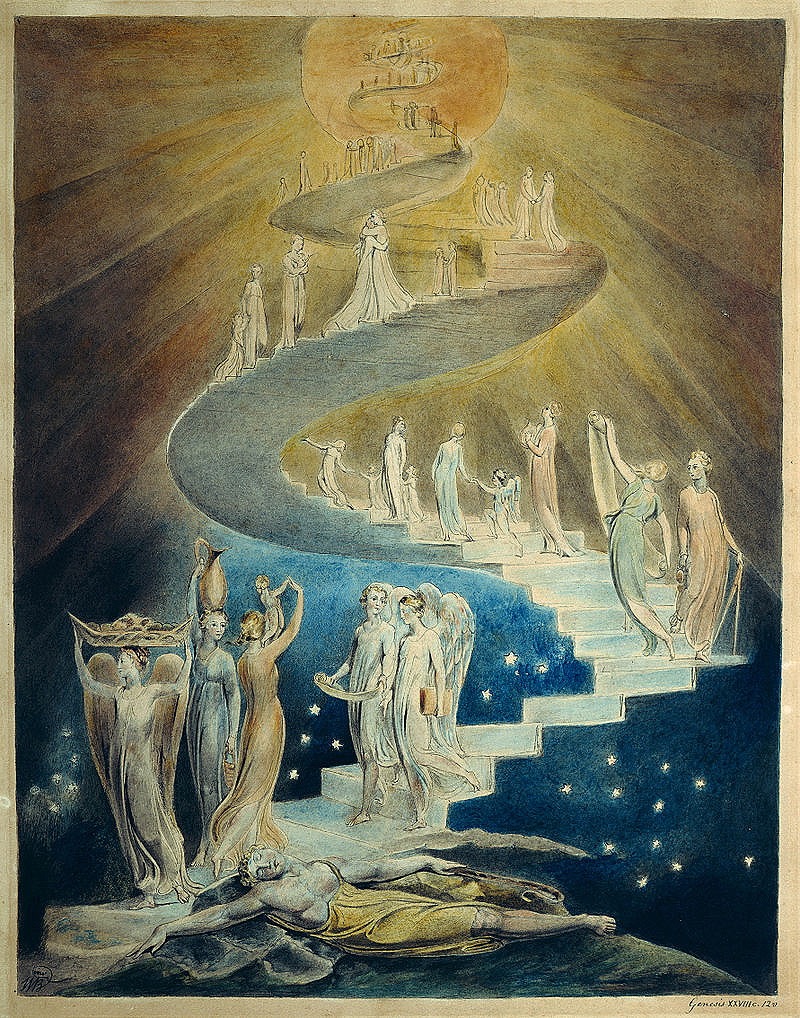Scenario-ing

Jacob's Ladder by William Blake, 1805
And Jacob awaked out of his sleep, and he said: "Surely the LORD is in this place; and I knew it not." And he was afraid, and said: "How full of awe is this place! This is none other than the house of God, and this is the gate of heaven." — Genesis 28:10–17 Jewish Publication Society (1917)
"Which scenario wins what?"
The pragmatist insists that we're just where we are. The philosopher wonders how we know. The scientist sets out to understand well enough to definitively say, with studied degrees of certainty. The cynic, quite honestly, doesn't care. The optimist remains ever hopeful. The skeptic insists upon the benefits of doubt. The pessimist prefers to pout. The writer shares the stories which the artist illustrates. The minstrel crafts the tune. The politician shares a Spandex® truth. Each holding their own perspective; each perspective, a part of some whole. Each provides a slant none of the others could know. None holds The Truth that everyone does. ©2020 by David A. Schmaltz - all rights reserved
The Muse found a social media posting which insisted that The Rockefeller Foundation with the support of Bill Gates had planned our present Pandemic, then implemented that plan with the clear intent of achieving world dominion. The proof, the posting insisted, was in the plan, which they'd even had the audacity to publish and widely distribute. What other purpose could they have possibly held? Well, The Muse quickly determined that the published plan fell under the broad category of a Scenario, the sort of plan never intended to be executed, as they say, but the kind of planning intended to consider an alternative future in the interest of deciding how one might prepare to face the resulting challenges. That plan was little more than a routine thinking about unthinkables, common to most every organization. The plan was a big What If? Some interpreters of it could only see the source of the shit presently hitting our collective fan.
Our best work seems somehow destined for misinterpretation. Someone's nose will most certainly get out of joint after experiencing it. Some counsel to seek the lowest common denominator to avoid such confusions, but how low could any serious analysis realistically go? Others insist that one just "Keep it simple, stupid," as if simplicity were not the most complicated possible form. Wherever we turn, a critic pops up, insisting that we deliberately created something we never intended, never even distantly imagined could be misinterpreted so, setting us up to prove some proposed negative so that they might definitively know what we'd intended. Once imprinted, conclusions rarely crack, no matter the push back.
Our Pandemic has spawned innumerable conspiracies. Not conspiracy theories, but certainties, instead. 5G nourishes the virus, or so The Russian Misinformation Agency insists, and some portion of our own citizenry seem to swallow the story without noticing the hook imbedded within it. The purpose of these speculations doesn't seem to be to cast any light upon our present predicament, but to spawn squabbling arguments and distrust among us. They cast experts as rubes and rubes as common-sensical experts. Controversy seems the goal, and we're here, crouched in the standard catcher's stance, waiting for the next pitch. Some of us foresaw this scenario coming. We'd considered even this unconsiderable, and imagined how we might respond when disinformation disassembled our very identity. Who might we have to become to repel this insidious assault? Who, indeed?
We might be in the unsettling process of reassembling our common identity again, as if we ever really shared one before. We cannot quite imagine becoming who we were. We cannot quite perceive who we must become. We're partway out of the chrysalis, pupa becoming perhaps butterfly, maybe moth, maybe Ozymandias. We've lost our freaking minds for now. Some of our scenarios foresaw this situation, and some of us consequently seem better prepared to cope. We all need to somehow figure this out, some by pointing fingers, others by lending hands. Our best work should continue to seem awfully suspicious. Our most helpful advice, most likely ignored or cruelly misinterpreted, for we inhabit the gate of heaven, and not quite heaven itself. Shall we throw all caution to the winds or harness those winds with our current abundance of caution? Which scenario wins what?


